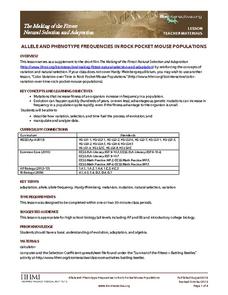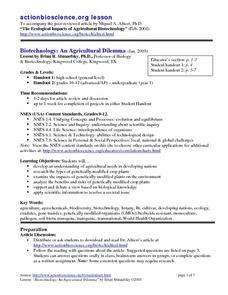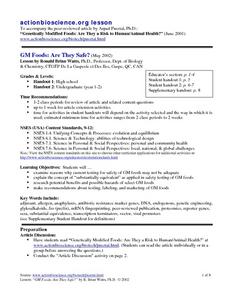LABScI
Genetic Equilibrium: Human Diversity
Investigate the Hardy-Weinberg Principle to explain genetic equilibrium. The 10th lesson plan of a series of 12 is a laboratory exploration of genetic equilibrium. Your classes use a mixture of beans to model allele and genotype...
Curated OER
Hardy-Weinberg Equilibrium
Students investigate how Hardy-Weinberg Equilibrium is established and what assumptions and conditions are necessary to reach Equilibrium. They model alleles using materials such as index cards, M & M's and goldfish.
Curated OER
Regents High School Exam: Living Environment 2008
Tne New York Regents High School Examinations are comprehensive and include various styles of questions, includingmultiple choice and the analysis of graphs. This particular version, the 2008 Living Environment exam surveys a variety of...
Curated OER
Hardy-Weinberg Equilibrium According to Hoyle:
Learners gain a feeling for the significance of the Hardy-Weinberg Equilibrium without using algebra but participating in an interactice game.
Curated OER
The Hardy-Weinberg Equilibrium
Students act out a drama in this lesson on one aspect of the Hardy-Weinberg Equilibrium. They are to follow all stage directions precisely and give it their best effort to get across the main points of the play.
Curated OER
Regents High School Examination: Living Environment 2009
Emerging ecologists need a full understanding of life, from the inner workings of a cell to the complex relationships among organisms. This examination is meant to assess high schoolers after an entire year course on the living...
Curated OER
Regents High School Examination: Living Environment 2007
Environmental science enthusiasts show what they know at the end of the year by taking this full-fledged final exam. They answer multiple choice, graph interpretation, and essay analysys questions, 73 of them in all. Topics range from...
Curated OER
Regents High School Examination: Living Environment 2005
The 2005 version of the Regents High School Examination in the area of ecology is as comprehensive as previous years' exams. It consists of 40 multiple choice questions on everything from the structure of DNA to the interactions within...
Curated OER
Regents High School Examination: Living Environment 2003
The living environment, from the interior of a cell to the complex relationships among populations, are queried in this final examination. Learners look at air pollution maps, diagrams of cells, population graphs, and drawing of cells....
Curated OER
Allele and Phenotype Frequencies in Rock Pocket Mouse Populations
In the deserts of Arizona and New Mexico, some tiny creatures show just how quickly natural selection can turn a mutation into an advantageous adaptation. Watch a video about rock pocket mice, who show that one small change can make all...
Curated OER
Hardy-Weinberg Equilibrium According to Hoyle: OR, Population Genetics or Platypapyrus foursuitii
Students use this exercise to help achieve a working knowledge of the Hardy-Weinberg Equilibrium without recourse to algebra. After participating in this activity, students gain a feeling for the significance of the Hardy-Weinberg...
Curated OER
Biotechnology: An Agricultural Dilemma
Learners investigate the types of genetically modified crop plants there are and the benefits and risks of such plants. The agricultural needs in developing nations for this biological knowledge to resolve societal issues is also...
Curated OER
How To Use Hardy-Weinberg to Find Gene Frequencies in s Wild Population
Pupils explore the gene frequency in Hardy-Weinberg Equilibrium experiments. They inquire into the studies of both black and gray squirrels. Basically the population genetics of certain squirrel populations. The species of each are...
Curated OER
Pre-Activity Worksheet: Natural Selection
Although the instructions include reading from a specific textbook, the tasks are appropriate for any unit dealing with how genotype frequency changes over time. Junior biologists define five vocabulary terms and then answer five...
Curated OER
Examining the Fossil Record
Students create an evolutionary tree based on fossil morphology and their ages. In this fossil record lesson plan, students are given 23 pictures of fossil. They study their morphology and arrange the fossils by age and structures on a...
Curated OER
Breeding Bunnies
Students learn the impact that genetics can have on the evolution of a population of organisms and become aware of the influence that the environment has onorganisms.
Curated OER
How Genes Work Lesson Plan
Students define the key terms that are the structure and function of DNA. In this genetics lesson students complete a lab activity in which they construct a model DNA structure.
Curated OER
Diversity/Natural Selection
Students examine mechanisms behind biological evolution and the theories that feed it, and are able to demonstrate their knowledge of these theories in a story.
Michigan State University
Bug Lyphe!
Introduce ecology classes to biodiversity and interdependence in ecosystems with a PowerPoint presentation. Then, they get up-close and personal with the invertebrate world by collecting insects, classifying them, and graphing their...
Curated OER
Reptiles and Amphibians
Introduce your class to various reptiles and amphibians. They will meet and identify a representative from each of the four major reptile families, then learn about and discuss reptile characteristics. Next, they will identify and...
Chicago Botanic Garden
Calculating Your Carbon Footprint
Unplugging from technology for one day per week will decrease your carbon footprint—are you up to the challenge? Part two in a series of three allows individuals to explore their personal carbon footprints. By first taking a quiz at home...
Chicago Botanic Garden
Calculating Your Ecological Footprint
You can lower your ecological footprint by recycling! Lesson four in this series of five has individuals, through the use of a computer, calculate their ecological footprints. Through discussions and analysis they determine how many...
Curated OER
GM Foods: Are They Safe?
Students examine the process for testing GM foods. They research benefits and hazards of a selection of GM foods. They also create images of new labels and marketing for GM foods.
Curated OER
DNA Fingerprinting: You Be the Judge!
Learners use their knowledge of DNA fingerprinting to evaluate the use fingerprints in courts, and will address the ethics of establishing a national database of fingerprints.

























